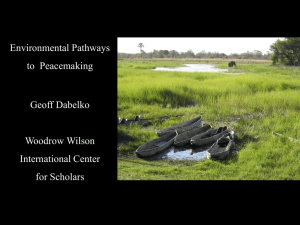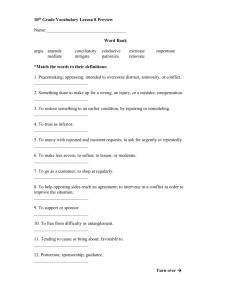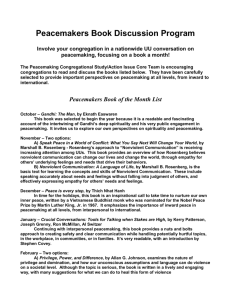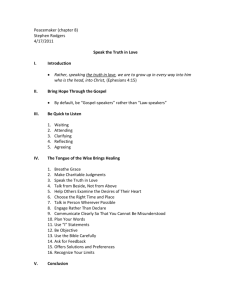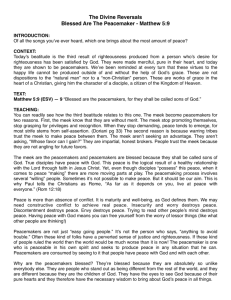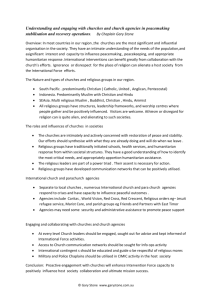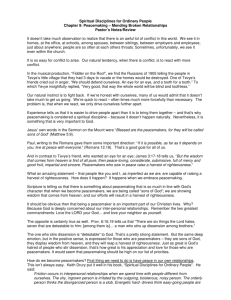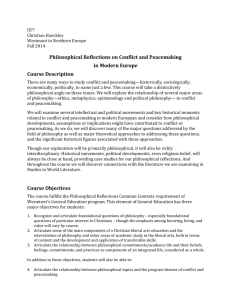Implementing a Culture of Peace Implementing a Culture of Peace
advertisement
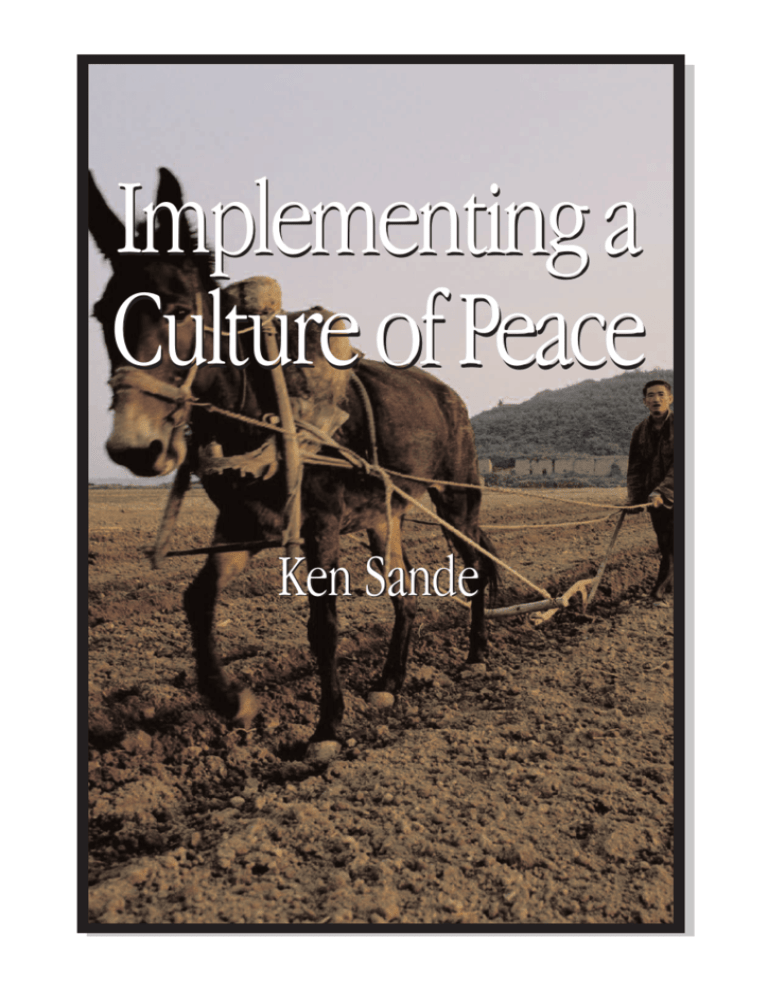
Implementing a Culture of Peace Ken Sande Ken Sande is an attorney, the author The Peacemaker: A Biblical Guide to Resolving Personal Conflict (Baker Books, 3rd Ed. 2003), Peacemaking for Families (Tyndale, 2002), and president of Peacemaker Ministries (www.Peacemaker.net), an international ministry committed to equipping and assisting Christians and their churches to respond to conflict biblically. © 2005 Peacemaker® Ministries. www.Peacemaker.net. Reprinted with permission. Implementing a Culture of Peace What is a “Culture of Peace”? A church has a “culture of peace” when its people are eager and able to resolve conflict and reconcile relationships in a way that clearly reflects the love and power of Jesus Christ. This type of church culture is described in the booklet entitled, Transforming Your Church: Cultivating a Culture of Peace. This detailed implementation plan is provided to suggest practical ways your church can develop and maintain this kind of culture. In particular, this plan will help you to cultivate the eight characteristics of a culture of peace in your church. These characteristics include: Vision: The church is eager to bring glory to God by demonstrating the reconciling love and forgiveness of Jesus Christ, and therefore sees peacemaking as an essential part of the Christian life (see Luke 6:27-36; John 13:35; 1 Cor. 10:31; Col. 3:12-14). Training: The church knows that peacemaking does not come naturally, so it deliberately trains both its leaders and members to respond to conflict biblically in all areas of life (see Gal. 5:19-21; Luke 6:40; Eph. 4:24-26; 1 Tim. 4:15-16; Tit. 2:1-10). Assistance: When members cannot resolve disputes privately, the church assists them through in-house trained reconcilers, even if the conflict involves financial, employment, or legal issues (see Matt. 18:16; Rom. 15:14; 1 Cor. 6:1-8; Gal. 6:1-2; Col. 3:16). Perseverance: Just as God pursues us, the church works long and hard to restore broken relationships, especially when a marriage is at stake, and even when attorneys are involved (see Matt. 18:12-16; Rom. 12:18; Eph. 4:1-3; Matt. 19:1-9; 1 Cor. 7:1-11). Accountability: If members refuse to listen to private correction, church leaders get directly involved to hold members accountable to Scripture and to promote repentance, justice, and forgiveness (see Prov. 3:11-12; Matt. 18:12-20; 1 Cor. 5:1-5; James 5:19-20). 2 IMPLEMENTING A CULTURE OF PEACE Restoration: Wanting to imitate God’s amazing mercy and grace, the church gladly forgives and fully restores members who have genuinely repented of serious and embarrassing sins (see Matt. 18:21-35; Eph. 4:32; 2 Cor. 2:5-11). Stability: Because relationships are valued and protected, leaders serve fruitfully year after year and members see the church as their long-term home (see 1 Tim. 4:15; Heb. 10:25). Witness: Members are equipped and encouraged to practice peacemaking so openly in their daily lives that others will notice, ask why they do it, and hear about the love of Christ (Matt. 5:9; John 13:34-35, 17:20-23; 1 Pet. 2:12, 3:15-16). Five Cultural Levels Because churches are made up of sinners, they do not naturally have a culture of peace. In fact, many churches have what might be called a “culture of disbelief.” They do not believe that there is much a church can do to help its members deal with the conflicts of everyday life. By God’s grace, however, churches can begin to see and believe that there is a great deal that they can do to equip and assist their people to respond to conflict biblically and effectively. This realization can inspire a church to go through a major transformation process in which they steadily raise their level of peacemaking productivity. This process is like nurturing a tree and bringing it to a point of abundant fruitfulness. It usually involved five levels of growth and productivity: Level 1—A Culture of Disbelief: People lack practical training in resolving conflict and doubt that the church can do much to help them resolve their differences. This church is like a tree that is missing some of its sweetest fruit. Level 2—A Culture of Faith: People begin to understand God’s peacemaking commands and promises and to believe that his ways will work in today’s culture. This church is like a tree blossoming in the spring. Level 3—A Culture of Transformation: People want to put off worldly ways of resolving conflict and are taking steps to learn how to respond to conflict biblically. This church is like a tree that is being pruned and cultivated for greater productivity. Level 4—A Culture of Peace: People are eager and able to resolve conflict and reconcile relationships in a way that clearly reflects the love and power of Jesus Christ. This church is like a tree producing a rich harvest. Level 5—A Culture of Multiplication: People delight in expanding God’s kingdom by showing other people and churches how they too can be peacemakers. This church is like a tree that is reproducing by spreading its seed. Ken Sande 3 Assessing Your Church Culture To assist you making a more accurate evaluation of your church’s conflict resolution culture, Peacemaker Ministries is developing a detailed assessment tool comprised of more than 60 questions. This tool will be web or computer based and may be used by a crosssection of your leadership team and congregation to obtain a composite and statistically reliable assessment of your church. Please visit www.peacemaker.net for a status of this tool’s development. Level 1 - A Culture of Unbelief (Missing Fruit) As explained in Transforming Your Church, there are many understandable reasons why churches hesitate to get involved in conflict. But behind most of them are two basic factors: a failure to understand what the Bible teaches about peacemaking, and a lack of faith that biblical principles will actually work in today’s culture. As Jesus taught, “You are in error because you do not know the Scriptures or the power of God” (Matt. 22:29). To put it simply, a culture of disbelief is usually the result of ignorance and unbelief. This is an unpleasant diagnosis. But if we simply deny it, our churches will not change. On the other hand, if we admit our lack of understanding and our unbelief to God, he is ready to forgive us. More than that, he is eager to lead us into all truth and increase our faith so that we can become his agents of change in our congregations. Level 2 - A Culture of Faith (Blossoms Appear) There are five ways that you and others in your church can cooperate with God as he strengthens your faith in his desire and ability to help you develop a culture of peace in your church. Pray for help. Ask God to forgive your unbelief, pray that he will guide your study of his Word, and ask him to give you faith and courage to do everything he teaches you. Rejoice in God’s grace as revealed in the gospel of Christ. The good news of our forgiveness in Christ is the driving motivation for peacemaking. Dwell on it, rejoice in it, and let it inspire your efforts to become an ambassador of his reconciliation. Dig into God’s Word and learn more about how he wants us to bring the love and forgiveness of Jesus to bear on everyday conflicts. You can start by studying the Bible passages cited at the beginning of this plan when describing the eight characteristics of a church that has a culture of peace. Find mutual encouragement with other people in your church. Give this booklet to other members or leaders in your church and build a core group of three or more people who 4 IMPLEMENTING A CULTURE OF PEACE are willing to seriously study these Scriptures and pray about these issues. Then work together to build faith and promote needed growth, as discussed in the next section. Contacting people outside your church. Look for churches in your area that have a reputation for peacemaking, and ask them how they do it. Peacemaker Ministries can also recommend a church in your area or denomination. You can also visit our web site (www.peacemaker.net.) and read the True Stories section. As you pursue these five faith-building activities, you and others can gain a better understanding of God’s marvelous vision for the church. He wants us to be so effective in imitating Jesus as we build and preserve relationships that the rest of the world will take notice and be drawn toward him. What an exciting vision! Level 3 - A Culture of Transformation (Pruning and Cultivating) Since peacemaking does not come naturally, churches need to make a deliberate effort to help individual members and entire congregations change they way they respond to conflict. This requires pruning away worldly habits and cultivating biblical attitudes and actions. This transformation process usually involves five areas of activity, which may be carried on simultaneously. 1. Secure explicit support from church leadership. Interest in biblical peacemaking often begins with a church member who is not in official leadership. As discussed above, such a person can do much on his own to learn about peacemaking, gain faith in God’s promises, and build interest among other members. As soon as possible, however, an effort should be made to gain support from church leaders, especially the senior pastor. As you approach them, be sensitive to their perspectives and interests regarding the church (Phil. 2:3-4; Prov. 22:11; see also the PAUSE principle of negotiation, which is explained in chapter 11 of The Peacemaker ). It is wise to first approach the leaders who are most likely to be receptive biblical peacemaking. Provide them with a few sample resources (see below), and give them time to study this issue. As they come on board, they can help you to build support among other leaders. There are several ways to educate church leaders about biblical conflict resolution. Offer each leader a copy of the Transforming Your Church document (PDF version) or booklet and a Peacemaker brochure; you could also offer a Guiding People through Conflict booklet to those who are sufficiently interested in peacemaking to read it. Visit Peacemaker Ministries’ website and download articles and stories that your leaders would find particular interesting in light of your church’s recent history. Ken Sande 5 Obtain a few copies of The Peacemaker for those who would like to study the topic more thoroughly. Obtain a set of Peacemaker Seminar audiotapes to loan to leaders who are more inclined to listen to audiotapes than they are to read. To present a positive and compelling view of redemptive church discipline, circulate copies of the Culture of Peace booklet, Church Discipline: God’s Search and Rescue Plan. Try to locate a church in your area or denomination that is building a culture of peace, and arrange for a meeting where your leaders can ask questions and hear about other’s progress. If you cannot locate such a church, contact Peacemaker Ministries for a referral. Check to see whether a Peacemaker seminar or Managing Conflict in Your Church seminar is scheduled for your area, and invite several leaders to attend with you, offering to cover their seminar fee as a gift to the church. Plan to share a meal together afterwards so you can discuss the material while it is fresh in mind. Encourage one or more leaders to attend Peacemaker Ministries’ Annual Conference with you. The inspirational keynotes, practical workshops, and contacts with similar churches can help to answer doubts and deepen enthusiasm for building a culture of peace. It is important not to push any of these activities aggressively. Church leaders are busy people, and it often takes quite a while for them to find time to read a booklet, listen to tapes, or attend a seminar. Gentle persistence over time is the key to winning support. Leadership support can be demonstrated in several ways. As leaders gain a growing appreciate for biblical peacemaking, they may: Personally encourage church members to get involved in peacemaking or seek assistance from a church reconciler. Formally adopt the Peacemaker’s Pledge as a statement of how they expect members to respond to conflict. Participate in or lead Sunday school classes or Bible studies on peacemaking. Endorse the peacemaking ministry from the pulpit and encourage others to get involved. Enact needed changes to church bylaws and policies. Make peacemaking a required qualification of church leaders, and require training in basic principles for all leaders. Pursue Reconciler Training so that they can do a better job of helping members walk through the conflicts of daily life. Senior pastors will usually give initial support to efforts to promote biblical conflict resolution. Since they have so many other pressing responsibilities, however, they will seldom make peacemaking a high priority right away. Take advantage of whatever support they are able to give, patiently offer the resources listed above, and look for opportunities to increase your pastor’s interest in peacemaking. 6 IMPLEMENTING A CULTURE OF PEACE The tipping point for most churches comes when something happens to cause the senior pastor to see peacemaking not as a helpful side-ministry, but as something that is absolutely essential to the well-being and fruitfulness of the church. When this happens, peacemaking will move from being on the outer edge of his pastoral radar to being on the inner circle of vital church ministries. Sometimes this happens when the Holy Spirit opens Scripture to him in a new way. Other times it occurs after a major conflict in his family or the church shakes his life, or he is deeply moved by a powerful and unexpected reconciliation. And sometimes it comes when he realizes that both he and other church leaders are exposed to unnecessary personal liability because of their failure to prepare the church to respond to conflict in a way that is biblically sound and legally prudent (see step five below). Whatever the cause, continue to pray and work for your senior pastor and other leaders to make biblical peacemaking a major priority of the church. When this happens, efforts to build a culture of peace will accelerate forward. 2. Form a core support group (Church Reconciler Team) Outside teachers and consultants cannot change a church’s culture. It has to be driven from the inside. Therefore, a core group of people (possibly called a “Church Reconciler Team”) needs to come together to form a “critical mass” to sustain ongoing efforts. Initial changes in the church may come slowly, and sustaining a culture of peace requires steady, ongoing effort. Therefore, the team needs to be deeply committed to the ministry of peacemaking and willing to persevere even when progress is slow. Ideally, church leaders should spearhead the team, but it may also include spiritually mature lay members who have gifts for peacemaking and are respected by the church’s leadership and congregation. A person with pastoral and administrative gifts may be designated as the team coordinator. He should schedule meetings, monitor delegated tasks, serve as a spokesman and contact person, and generally keep things moving forward. The team should work as closely as possible with related ministries in the church, such as a counseling, discipleship, or family ministries. It is also helpful if an attorney can be recruited to the team to address legal concerns. Initial activities of the Reconciler Team could include: studying The Peacemaker and Guiding People through Conflict; watching the Peacemaker Seminar videos together; having one or more members begin Reconciler Training; leading Sunday school classes or small group Bible studies on peacemaking; and sending members to Peacemaker Ministries’ Annual Conference to learn how teams in other churches are making progress. By God’s grace, these activities will raise interest in peacemaking, attract more gifted people to the team, and trigger opportunities to assist church members who are involved in conflict. As God brings forth fruit, momentum can build. Ken Sande 7 3. Educate the entire congregation in peacemaking God’s peacemaking principles are like yeast. The more thoroughly they are worked into a congregation, the more good they can do. This requires an ongoing effort to teach peacemaking to every person in the church. This educational effort can be carried out in several ways, depending on the interests of your church. If you can gain support from your senior pastor at the outset, he can launch your educational efforts with a sermon series that elevates the congregation’s interest in and commitment to peacemaking. This would set the stage for further ongoing education in smaller settings. If your senior pastor is not yet ready to do substantial preaching on peacemaking, you can start at a more basic level with something as simple as personally handing out the Peacemaker brochure and talking informally with people who may have an interest in peacemaking. To make it easy for people to acquire information, you can set up a brochure rack in the church lobby or library where they can pick up free Peacemaker brochures, culture of peace booklets, and “Got Conflict?” brochures (sample available soon). You could lead an informal small group discussion on peacemaking for an initial core group, using introductory or complete Bible study materials developed by Peacemaker Ministries. As interest grows, you could ask church leaders to approve a Sunday school class on peacemaking. (Peacemaker Ministries can provide a videotape version of the seminar, or a more detailed discipleship version, depending on how deep people want to dig.) Offer special Sunday school classes or small group Bible studies for married or engaged couples, using Peacemaking for Families as a reference. Women in the church are often more sensitive to relational problems. Therefore, they will often be enthused about a small group Bible study that equips them to respond to conflict biblically. If you enjoy working with children, you could use The Young Peacemaker curriculum to teach peacemaking at home, in Sunday school, or vacation Bible school. Since the teen years are filled with change and conflict, working peacemaking into teen Sunday school and youth group training can bear a great deal of fruit. As your pastor’s interest in peacemaking grows, encourage him to do a sermon series on biblical conflict resolution, which would raise the significance of this ministry to a higher level in the eyes of the congregation. Include an introduction to peacemaking and church discipline for new members through your membership class (sample materials available soon). Host a live Peacemaker Seminar for your members. Larger churches often provide this seminar first for their leaders (pastors, elders, deacons, Sunday school and small 8 IMPLEMENTING A CULTURE OF PEACE group leaders), and then for their entire congregations. Contact the Christian Counseling and Educational Foundation and make their excellent resources, which support peacemaking, available to your congregation. 4. Train gifted reconcilers When church members are taught how to respond to conflict biblically, they will be able to resolve most of their conflicts personally and privately. But sometimes they will need help. This is where a church reconciler can step in. Reconcilers are gifted church members, leaders, or staff who have been trained to help others deal with conflict. This help may be provided through conflict coaching (advising one person how to respond to conflict biblically) or mediation (meeting with both parties to facilitate discussion and agreement). Well-trained church reconcilers can help members respond biblically to a wide variety of personal, family, employment, business, and even legal disputes. Reconciler Training involves fifteen hours of instruction by audio or videotape, and a two-day live Practicum where students are guided through realistic mediation role-plays. (Individuals who desire an even higher level of competence and experience may pursue more advanced training after completing Reconciler Training. Those demonstrating particular gifting, calling, and skill in biblical peacemaking may apply to the Certification Program , our most rigorous training, to work toward earning the designation Certified Christian Conciliator™.) It is important to train both male and female reconcilers, and even married couples who can work together, so that church members have a variety of reconcilers to choose from when looking for advice, especially in marital conflicts. It is also helpful to recruit a few reconcilers who are experienced in business or legal matters. Once a church has trained a core group of reconcilers, they can advertise their services within the congregation by placing the “Got Conflict?” brochure (sample available soon) in a brochure rack and mentioning it regularly to the congregation. In this brochure, the church can describe the reconciliation ministry and list its reconcilers and their telephone numbers so that others can easily contact them. 5. Upgrade the church’s organizational documents As the world becomes more rights-oriented and litigious, churches are being sued at an alarming rate. Lawsuits against churches are usually based on claims of negligence, breach of confidentiality or fiduciary responsibility, defamation, sexual misconduct or harassment, wrongful termination, or intentional infliction of emotional distress. Even when churches win these kinds of cases, they are often forced to invest hundreds of hours and thousands of dollars in defending themselves. And when churches lose a case, Authortopic 9 judgments can run into the millions of dollars, with church leaders sometimes being held personally responsible to pay the award. Exposure to legal liability can be substantially reduced by upgrading church bylaws and adopting written policies for counseling, discipline, and youth worker screening. Such documents are essential to educate members and prove that they have given “informed consent” to the church’s ministry practices, which is the single most effective way to prevent disgruntled members from later suing the church. Peacemaker Ministries has developed comprehensive risk management package called Managing Conflict in Your Church (see the Risk Management section for samples of this material). This training is available on audio or videotape, and includes a 220 page manual that contains 80 pages of model policies and forms that are also provided on a computer floppy diskette. By upgrading its organizational documents and policies, a church can prevent lawsuits and ensure that its energy and resources are devoted to forward moving ministry instead of defensive litigation. Level 4 - A Culture of Peace (Harvest Time) As your church develops a culture of peace, you will start to see the sweet fruit of peacemaking and reconciliation. To maximize your harvest and compensate for the fact that people forget what they have learned, it is important to continue educational efforts on a regular basis. This can be done in several ways. 1. Pulpit reinforcement Encourage your pastor to become thoroughly familiar with the basic peacemaking principles (4G’s, promises of forgiveness, seeking help from reconcilers, etc.) and to regularly mention and reinforce them during sermons that touch on these principles. This is also a good time for him to mention that helpful literature is available in a brochure rack, and to encourage people to call a trained church reconciler if they need some advice on how to deal with a conflict. 2. Sunday school and small group Bible studies Offer peacemaker Sunday school classes (for both adults and children) or small group Bible studies every year so that new members will have an opportunity to receive this training. Ask your pastor to personally support them from the pulpit, and urge former students to encourage their friends to attend. 3. Premarital counseling and marriage enrichment To improve your congregation’s protection from divorce, require couples in premari- 10 IMPLEMENTING A CULTURE OF PEACE tal counseling to read through Peacemaking for Families together and to discuss with a their counseling pastor or a reconciler their answers at the end of each chapter. You could also offer special peacemaker Bible studies with a marriage emphasis for couples that have been married for years and want to improve their conflict resolution skills. 4. Annual Reconciliation Sunday One of the most effective ways to promote peacemaking in a church is to have an annual “Reconciliation Sunday.” This service can be used to celebrate God’s reconciling work in the congregation and to reinforce foundational conflict resolution principles. This service could involve a sermon on some aspect of peacemaking, testimonies by members who have recently experienced reconciliation, and handing out copies of the Peacemaker’s Pledge and calling members use it as they go to one person who is struggling with a conflict and teach them how to resolve it biblically. Click here for further materials on the concept of a Reconciliation Sunday. 5. Budget funds for peacemaking Like most ministries in a church, peacemaking can cost money. As your church experiences an increasing harvest from peacemaking, it should be motivated to continue sowing by budgeting money for a variety of activities. (Some of these funds may be budgeted as a specific “peacemaking” line item, but others could be included in areas such as education, missions, counseling, evangelism and outreach, pastoral ministries, membership training, or continuing education for pastors.) Possible peacemaking expenses include: Sunday school and Bible study materials Educational resources for congregation (brochure rack) Educational resources and continuing education for pastoral staff Educational resources and continuing education for reconcilers Counseling resources (books, brochures, workbooks, etc.) New members materials (brochures and books) Reconciliation expenses (it is sometimes helpful for a church to help cover some of direct costs of peacemaking, such as flying an estranged daughter home to meet with her mother) Supporting Peacemaker Ministries as it works to develop additional resources, to keep churches informed of new peacemaking concepts, and to reach out to more churches 5. Send a delegation to Peacemaker Ministries’ Annual Conference Peacemaker Ministries’ Annual Conference provides an excellent opportunity for your pastors and members of your Church Reconciler Team to deepen their understand- Ken Sande 11 ing of and enthusiasm for biblical peacemaking. Outstanding national keynote speakers and seasoned workshop presenters provide a wealth of inspirational and practical teaching and instruction. The best part of the conference, however, is to meet other pastors and reconcilers, to hear how God is working in their churches, and to share with them what he is doing in your congregation. Attendees invariably come home challenged, inspired, and more dedicated than ever to the ministry of peacemaking. Level 5 - A Culture of Multiplication (Reproducing) As your church experiences the fruit of peacemaking, it can multiply the harvest by letting its experiences and expertise overflow to other churches in your community and denomination. This is a two-way blessing, because the more active your church is in sharing with others what it has learned about peacemaking, the more your church itself will grow in this ministry (see Philemon 6). This multiplying ministry can be carried out in several ways: 1. Equip and encourage members to carry peacemaking into the world. One of the best ways for Christians to witness for Jesus Christ is to demonstrate his love and power in the conflicts of their daily lives. Therefore, members should be encouraged regularly to see conflicts with family, friends, neighbors, coworkers, or relatives as opportunities for ministry. If they are a party to a conflict, they can ask God for humility to practice confession, loving confrontation, forgiveness, and biblical negotiation in a way that shows Jesus’ presence in their lives. (see True Stories for real-life examples.) If they see others in conflict, they can ask God for wisdom on how to graciously offer to assist them to reconcile and reach agreement (click here for a great example). As word gets around of their ability to make peace effectively, others may seek them out for advice, which can open the way to invite others to church and share the gospel. And when a church gains a reputation for resolving “small” problems, it will have greater credibility when it speaks to “large” issues that impact the entire community. 2. Teaching Peacemaking to Children Nearly all parents are weary of their children’s bickering, arguing, controlling, and rebelling. Therefore, many parents would welcome any program that would teach their children to get along and resolve conflict without constant parental involvement. Such programs offer an excellent way to minister to the unsaved and draw them into the church. This can be done in several ways: Provide a Young Peacemaker Sunday school class on a regular basis and advertise it in your local newspaper or radio. Many parents might come to church just to get their kids into this class! 12 IMPLEMENTING A CULTURE OF PEACE Advertise a special Vacation Bible School class on peacemaking each summer. To increase interest, have members go to houses in your neighborhood or community to talk with people about the class or leave special “door hangers” for those who are not home. Even if people do not send their children to the class right away, this would be a wonderful way to build connections with your community. Mothers can use peacemaking to reach out to other mothers in their neighborhoods. Since their kids often play together, they also fight together. Therefore, many mothers might be interesting in attended a weekly neighborhood Young Peacemaker Bible study, which would enable all of them to give children consistent guidance for resolving conflict. The Young Peacemaker material includes an explicit gospel presentation, which can be used to witness to unsaved parents. As violence increases in our culture, many people outside the church are eagerly looking for ways to protect their children and prepare them to deal with conflict. People are particularly open when children in their schools have been injured by violence. These are opportune times to go to local school officials and introduce them to the secular version of The Young Peacemaker. Some churches have also used these tragic events as opportunities to draw non-Christians to special classes on peacemaking. 3. Send peacemakers with mission teams Local churches send out thousands of short-term mission teams every year. These teams could carry the ministry of peacemaking to other churches around the world if every team included a designated peacemaker. This person could do three things to guard the team against divisive conflict and magnify its effectiveness in the field. First, the peacemaker could teach basic peacemaking principles to each team member before they leave home. Second, if conflicts erupt within the team or with the hosting organization in the field, the peacemaker could act as a conflict coach or reconciler to resolve the matter quickly and biblically. Third, with special cross-cultural training, the peacemaker could teach church leaders in the field how to bring peacemaking into their churches. Here is what three pastors in Uganda wrote after attending such training. “For me to forgive was like an abomination. I could teach on forgiveness yet I could not forgive. But when peacemaking came I confessed and repented of unforgiveness. I have asked for forgiveness from everyone whom I had refused to forgive, starting with my family and my church.” “When I went to the conference I had the idea of committing suicide. These teachers came to heal our souls and save us from death. I had started looking at everybody as if they were all wrong, from my wife and children to the church I pastor. The teaching was medicine to me. It healed my heart and thoughts. I was delivered and became peaceful. I now love everybody including those I thought were my enemies.” Ken Sande 13 “Through this teaching I knew I had been very bad to my wife. I have been oppressing her in many ways. I repented before her. Now peace prevails. The whole world should get this teaching, not only in churches but also in offices and every home.” This kind of training is like a pebble thrown into the middle of a large pond. By God’s grace, the ripples could spread from one church to another, bringing an ever-wider circle of peace and praise to our Lord Jesus Christ. 4. Develop a church-based reconciliation ministry Many churches are finding that their reconciler ministry can be used beyond their own congregation. Once they have an experienced group of reconcilers, they are able to open up their services to people in their community. These church-based reconciliation ministries provide an excellent way to demonstrate the gospel of peace to people outside the church who are looking for assistance with their conflicts. Click here for more ideas. 5. Share your experience with other churches in your community or denomination As God blesses your church through the ministry of reconciliation, you can multiply that blessing by sharing what you have learned with other churches in your community or denomination. There are several ways you can do this. Host a Peacemaker or Young Peacemaker seminar, or a Managing Conflict in Your Church seminar, and invite other church leaders or congregations to attend. Train church conflict interveners in your church so that they can assist other churches when they cannot resolve internal conflicts on their own. Offer to work with denominational leaders in your state to promote peacemaking. Your testimony of what your church has done to build a culture of peace will carry much more weight than a booklet describing what churches could do to promote peacemaking. You could share your testimony through an article in your denominational newsletter, or by writing an open letter that denominational leaders can use as they talk to other church leaders about this ministry. Encourage your denomination or regional district, convention, or presbytery to make peacemaker training a requirement for credentialing. Peacemaker Ministries is working with reconcilers who want to work together to promote peacemaking within their particular denominations. If you would like to learn what is being done in your denomination, or join in these efforts, please call our office. Finally, do not overlook the opportunity to promote peacemaking by seeking reconciliation with people who have left your church in anger. Some of them may still be struggling with bitterness and would be greatly served if someone from the church sought them out to make peace (see Matt. 5:21-24). If your church experienced a split in the past, this ministry could take place on a large scale, as leaders from your church 14 IMPLEMENTING A CULTURE OF PEACE seek out the other church to make peace. Many people will reject such overtures, but God may enable you to rescue others from the acid of unforgiveness. Even if you are rejected, your own members will see that you take God seriously when he says, “If it is possible, as far as it depends on you, live at peace with everyone” (Rom. 12:18). As more and more churches implement these kinds of activities, they are discovering new and creative ways to cultivate a culture of peace. If you would like to share your experiences and keep informed of what others are learning, please Contact Us . MUNICH INTERNATIONAL COMMUNITY CHURCH Steve Henderson, Pastor • steve@munichurch.de • www.munichurch.de Sunday Worship Services at 4:00 pm Mozartstr. 12 • 80336 München ( i n t h e F r e i e E va n g e l i s c h e G e m e i n d e ) g o e t h e p l a t z a t u 3 / u 6
